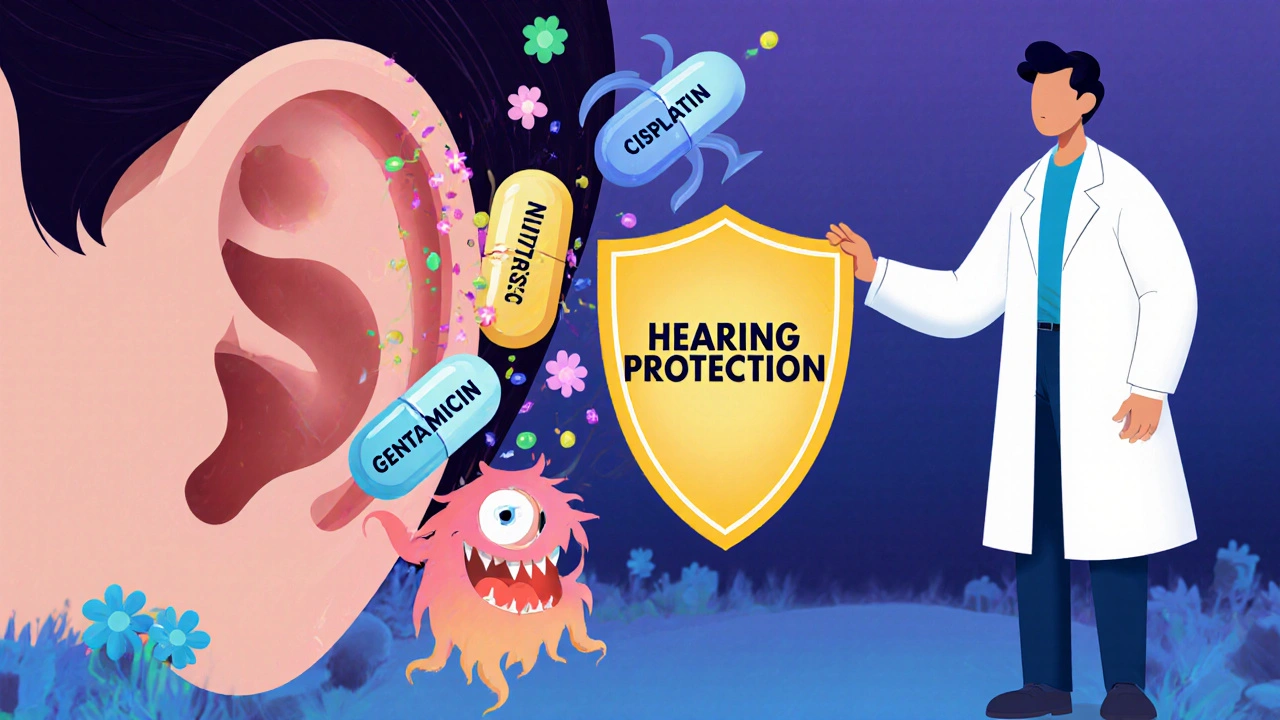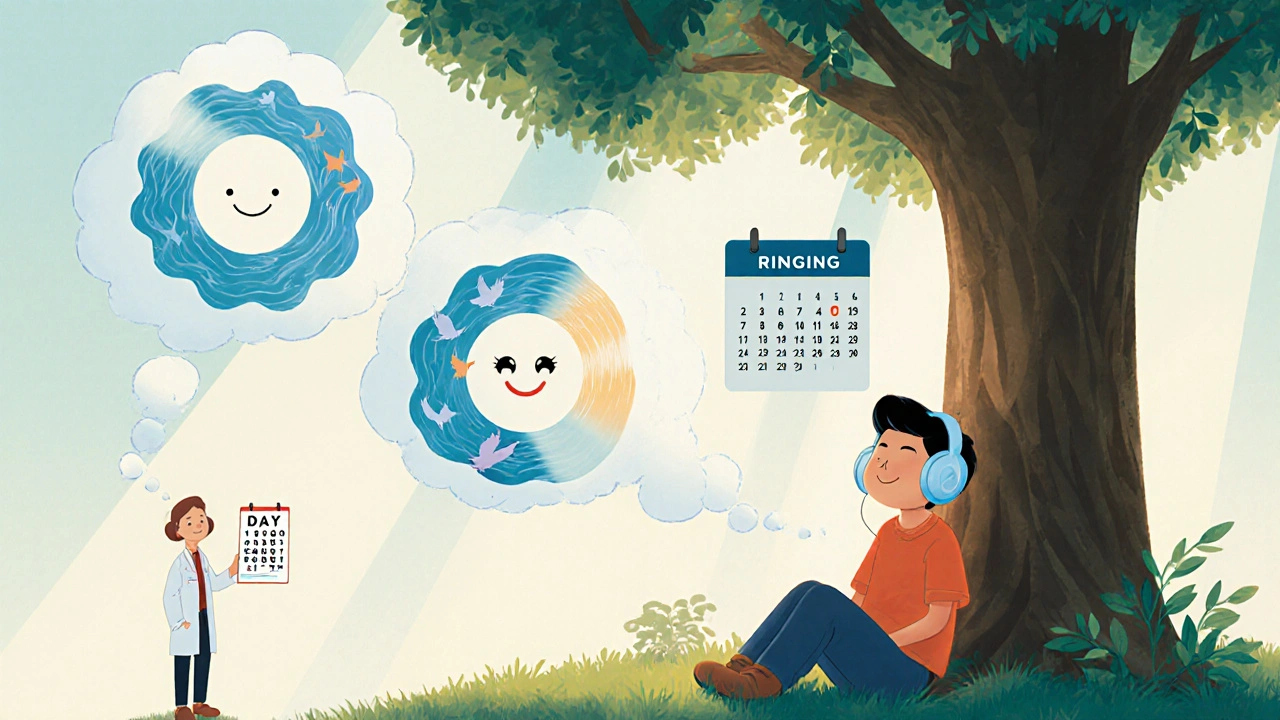Medication Tinnitus Risk Checker
Check Your Medications for Tinnitus Risk
Identify potential tinnitus risk from medications you're taking and learn what to do next.
Results
Tinnitus Risk Summary
Important: Do NOT stop prescribed medications without consulting your doctor. If you experience tinnitus while taking any of these medications, contact your healthcare provider immediately.
Many people notice a persistent ringing, buzzing, or hissing in their ears after starting a new medication. It’s not just in their head - medication-induced tinnitus is real, and it’s more common than most people think. While it’s often temporary, it can also be a warning sign of permanent hearing damage. The good news? You don’t have to live with it. Understanding which drugs cause tinnitus, how it happens, and what to do next can help you protect your hearing - without giving up necessary treatments.
What Exactly Is Medication-Induced Tinnitus?
Tinnitus isn’t a disease. It’s a symptom: your brain hears sound when there’s no external source. That sound can be a high-pitched ring, a low hum, or even a pulsing noise that matches your heartbeat. When it shows up after starting a new pill, injection, or cream, it’s likely linked to ototoxicity - damage to the inner ear caused by certain medications.
More than 600 prescription and over-the-counter drugs are known to trigger or worsen tinnitus, according to recent clinical reviews. These include common medications like aspirin, ibuprofen, and even some antidepressants. The damage doesn’t always show up right away. For some, tinnitus starts within hours. For others, it creeps in after weeks or months of use.
The inner ear is delicate. It contains tiny hair cells that convert sound into electrical signals your brain understands. Ototoxic drugs can interfere with these cells or the nerves that carry signals to the brain. In some cases, the damage is reversible. In others, it’s permanent. That’s why recognizing the signs early matters.
Which Medications Are Most Likely to Cause Ringing in the Ears?
Not all drugs carry the same risk. Some are notorious for causing tinnitus, while others rarely do. Here’s a breakdown of the most common culprits:
- Aminoglycoside antibiotics - Drugs like gentamicin and tobramycin, often used for serious infections, are among the most ototoxic. They can cause permanent hearing loss and tinnitus, especially with long-term IV use. Topical forms (like ear or eye drops) are much safer.
- Chemotherapy drugs - Cisplatin, used to treat cancers like testicular and lung cancer, causes tinnitus in 30-70% of patients. Hearing loss often starts with high-frequency sounds before affecting speech.
- Loop diuretics - Furosemide (Lasix) and bumetanide, used for heart failure and fluid retention, can cause temporary tinnitus and hearing loss, especially at high doses or in people with kidney problems.
- High-dose NSAIDs - Aspirin and ibuprofen can cause ringing in the ears - but only at very high doses. For aspirin, that means over 4,000 mg per day. Most people take 325-650 mg for headaches, which rarely causes issues. Ibuprofen at 800 mg three times daily (common for severe pain) has been linked to tinnitus in multiple patient reports.
- Antimalarials - Quinine, once used for leg cramps and now mostly for malaria, can cause tinnitus within 24-72 hours of use. Symptoms usually fade after stopping the drug.
- Isotretinoin (Accutane) - This acne medication has a moderate risk. Around 5% of users report tinnitus, though the manufacturer claims it’s less than 1%. If you’re on Accutane and notice ringing, don’t ignore it.
- Antidepressants and benzodiazepines - These are low-risk, but not risk-free. SSRIs like sertraline (Zoloft) have been tied to tinnitus in rare cases, sometimes even after stopping the drug. Benzodiazepines like Xanax or Valium usually cause tinnitus only after long-term use (6+ months).
It’s worth noting: not everyone on these drugs gets tinnitus. Genetics, kidney function, age, and existing hearing loss all play a role. Some people are just more sensitive.
Is the Ringing Permanent? What Happens When You Stop the Drug?
This is the big question. Will the ringing go away if you stop the medication?
For most people, yes - about 60% of cases improve or disappear after discontinuing the drug. But not all drugs are created equal.
- Reversible: NSAIDs, diuretics, quinine, and high-dose aspirin usually cause temporary tinnitus. Symptoms often fade within days to weeks after stopping.
- Partially reversible: Some antidepressants and benzodiazepines may take months to resolve, and in rare cases, symptoms linger.
- Often permanent: Aminoglycosides and cisplatin can destroy inner ear hair cells. Once those are gone, they don’t grow back. Even if you stop the drug, the tinnitus and hearing loss may stay.
Timing matters. About 70% of patients notice tinnitus within the first two weeks of starting the drug. But delayed reactions can happen - especially with antibiotics or chemotherapy - sometimes up to 90 days later.
If you’ve been on a medication for months and suddenly notice ringing, don’t assume it’s stress or aging. It could be the drug.

What Should You Do If You Notice Ringing After Starting a New Medication?
Here’s the most important rule: Never stop a prescribed medication on your own.
Stopping antibiotics, chemotherapy, or blood pressure drugs without medical supervision can be dangerous. Instead, take these steps:
- Track your symptoms. Note when the ringing started, how loud it is, whether it’s in one or both ears, and if it’s constant or comes and goes.
- Check your dosage. Are you taking more than recommended? High-dose ibuprofen or aspirin is a common trigger.
- Call your doctor. Tell them exactly what you’re taking and when the ringing began. Bring a list of all your medications, including supplements and OTC drugs.
- Ask about alternatives. Your doctor might switch you to a different antibiotic, lower your dose, or suggest a non-ototoxic pain reliever.
- Request a hearing test. An audiologist can check your hearing baseline and track changes. This is especially important if you’re on cisplatin, gentamicin, or other high-risk drugs.
Some clinics now offer routine hearing monitoring for patients on ototoxic drugs. If yours doesn’t, ask. Early detection can prevent permanent damage.
Can You Manage Tinnitus If You Can’t Stop the Medication?
Sometimes, you can’t stop the drug - especially if it’s treating cancer, a life-threatening infection, or a serious heart condition. In those cases, the goal shifts from stopping the tinnitus to managing it.
Two proven approaches help:
- Sound therapy - Using white noise machines, fans, or apps that play soothing sounds can mask the ringing and help your brain tune it out. Studies show this reduces distress in 60-70% of patients.
- Cognitive behavioral therapy (CBT) - CBT doesn’t silence the sound, but it changes how you react to it. People who complete CBT for tinnitus report less anxiety, better sleep, and improved quality of life.
These don’t fix the damage - but they make living with the sound much easier. And they work even while you’re still on the medication.

How Can You Prevent Medication-Induced Tinnitus?
Prevention starts with awareness. Here’s what you can do:
- Know your risk. If you have a history of hearing loss, kidney disease, or are over 60, you’re more vulnerable to ototoxicity.
- Ask before you take. When a new drug is prescribed, ask: “Could this cause ringing in the ears?” Many doctors don’t bring it up unless you ask.
- Don’t self-medicate with high doses. Taking extra ibuprofen for a headache? That’s a common mistake. Stick to the label.
- Monitor your hearing. If you’re on long-term NSAIDs, diuretics, or antidepressants, get your hearing checked once a year.
- Be cautious with supplements. Some herbal products (like ginkgo biloba) are marketed for tinnitus, but they can interact with medications or even worsen symptoms.
There’s also promising research on otoprotective agents - drugs that shield the ear from damage without reducing the effectiveness of the main treatment. Clinical trials are underway, and some may be available within the next few years.
Bottom Line: Don’t Panic, But Don’t Ignore It
Medication-induced tinnitus is frustrating, but it’s rarely an emergency. Most cases are temporary. Still, it’s a signal your body is sending - and it deserves attention.
If you’ve noticed ringing after starting a new pill, talk to your doctor. Don’t assume it’s normal. Don’t assume it’s just stress. And don’t stop your meds without guidance.
With the right steps, you can protect your hearing, find safer alternatives, or learn to live comfortably with the sound - without sacrificing your health.


Deepak Mishra
November 14, 2025 AT 23:14Diane Tomaszewski
November 16, 2025 AT 18:34we just take pills like candy and forget our bodies are delicate machines
hearing is precious
David Rooksby
November 17, 2025 AT 15:12Teresa Smith
November 18, 2025 AT 23:19Danish dan iwan Adventure
November 19, 2025 AT 02:13John Mwalwala
November 20, 2025 AT 03:28Dan Angles
November 20, 2025 AT 07:48Melanie Taylor
November 21, 2025 AT 08:14Turns out she was right all along!!! 🙏
Also, white noise machines saved my life after my antidepressant started ringing 🎧❤️
ZAK SCHADER
November 22, 2025 AT 22:16